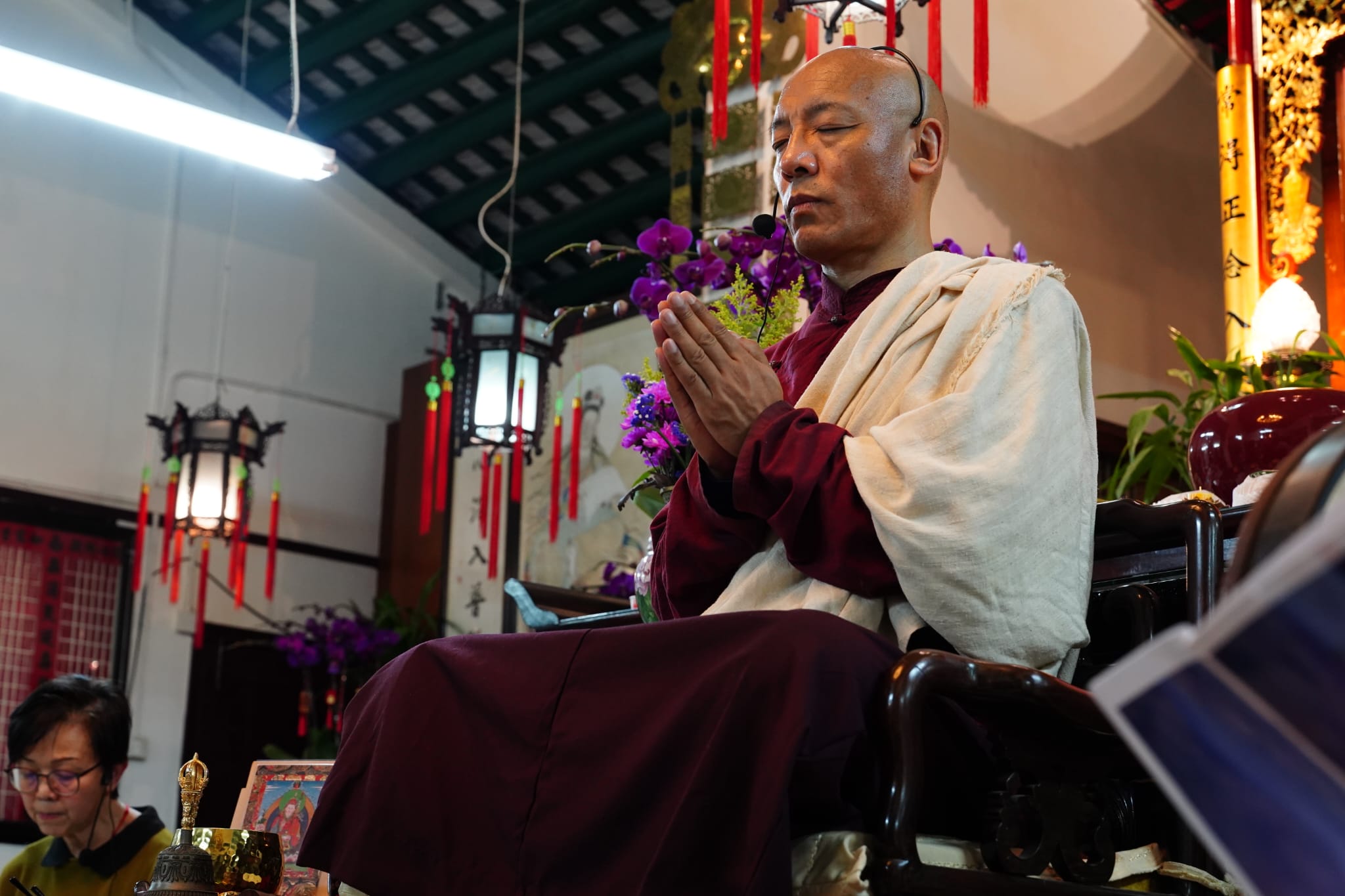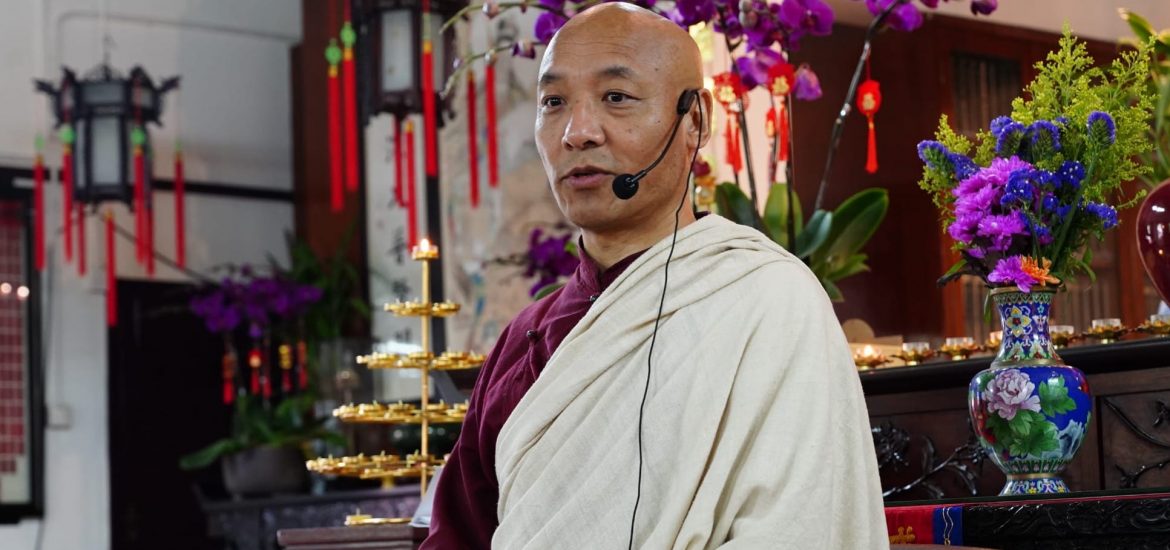It has been five years since my last conversation with Nyingma master Anam Thubten Rinpoche. The last time he was in Hong Kong was in 2018, and this year he was in February to host a three-day residential retreat and a Tsok (feast offering). Every time we reunite, I like to think that we have a fruitful time reflecting productively on the crises besetting the world, along with possible solutions. This interest in affairs affecting the globe and the wellbeing of sentient beings is inseparable from practicing Dharma. During February’s encounter, we spent much of our time deliberating on the planet’s unprecedented situation and the nuanced responsibilities of our Buddhist leaders.
The founder and spiritual advisor of Dharmata Foundation said that Buddhist leaders should teach their communities some hard truths. “I think Buddhist leaders have to be in touch with the fast-changing nature of the world and society. I think we are going through a lot of confusion and anxiety in the world right now. The present structures, customs, and even religious and political institutions are collapsing or being challenged. Everybody is feeling like the ground is shifting beneath their feet.”
He likens our circumstances to the bardo itself, which in Vajrayana belief is the intermediary state between death and rebirth. “This is the bardo,” he laughs, “we are kind of losing the world which we had so much certainty in and haven’t really arrived at some kind of new era. We just don’t know where we’re going.”

Rinpoche warns that politically, socially, spiritually, and ecologically, it is very hard to take refuge in comfort or certainty. “Politics is unstable, social norms are falling apart, and I don’t know whether that’s good or bad but just that it is all being propelled by technological advancement, late capitalism. . .” He thinks Buddhist leaders need to become aware of what is happening and speak or teach in a way that responds to what people need.
“Impermanence is a key Buddhist teaching and so this is not an unexpected situation. We just have to tell people to remember the truth of impermanence and perhaps try to go inside.” Rinpoche believes that it is futile to hold on what is outside, external. People need to go inside and find refuge in the Dharma, in fearlessness, in stillness. The Buddha spoke of the unconditioned and the conditioned, with true spirituality being true to the unconditioned.
“Money, relationships, or social status are all conditioned and therefore lack solidity. And now we’re on rickety ground! So, people need to go inside to find the unconditioned within. It could be the Dharma itself, or it could at least be inner peace. . . not for a sense of security!” he adds, laughing. “But a sense of meaning or joy, and to find wisdom, light, and courage inside. It’s time for everyone to find these things within.”
In a world driven by materialism and insecurity, Rinpoche laments that our society is still “primitive” in the sense of spiritual maturity. “We are an advanced civilization, technologically, but spiritually, I hate to say we are not evolved, and that is why there are still wars, that’s why we live in a dog-eat-dog world and that is primitive, isn’t it?” There are many people in the world that are bodhisattvas, but Rinpoche points out that many of the positions of authority that people should look to for guidance and emulation are not held by said bodhisattvas. He mentions politicians in the United States, where he is based, without getting into the specific political positions. An appalling 15 per cent approval rating for the US Congress is no surprise: “Everything they say is so dualistic and divisive, they almost glorify all vices like greed, competition, and disrespecting people openly. . . and people have to vote for them! I love America, but overall I think the situation in the country reflects how we haven’t transcended ego and perhaps we will never do so as a species.”

Rinpoche urges that we should avoid becoming “beasts in nice clothes,” proposing an enlightened model that avoids the pitfalls of late capitalism. “I think that an enlightened model will allow us to work hard and succeed without going overboard in competing with each other, where enjoying society’s benefits becomes a free for all where only the powerful win at the expense of the great majority. “We can create wealth in a way that even benefits society,” he suggests, “and this is not a new idea. The Buddha himself favored a system where people could thrive without harming one another. If you look at the Vinaya, the monastic law, it was based on communal values of mutual care rather than a competitive, capitalistic model.
Refocusing on America, I raised the crisis of mental health, in particular depression, among young people, especially Zoomers (Gen Z) and Generation Alpha. The dominance of social media in the lives of young people, while not a direct cause of existential distress and a loss of meaning, has certainly fueled negative trends. But Anam Thubten Rinpoche stresses that social media like Instagram and Facebook are very deceptive, and young people might not realize that what people curate (and sometimes go to great lengths to present) are an illusion.
“Many of them [youth] might not have thought of questioning what social media is all about. I think young people believe social media is the absolute truth and live in it more than they do in the real world. They talk to people online more than offline. It’s a matrix of illusion and you cannot just worship it.” Rinpoche is not demanding that Zoomers solely go offline and figuratively “touch grass,” but mindfulness about the dubious non-reality of apps like TikTok and Facebook would go some way to ameliorating and countering any incorrect understandings about the parallel fake reality constructed by social media.

In a world where the number of role models is declining, should Buddhist leaders assume certain responsibilities while keeping away from direct political lobbying? This is a question that Rinpoche has reflected on for a long time. “On one hand we Buddhist leaders don’t want to be involved with the ‘mess’ of politics, since that would force us to take partisan sides and be ‘for’ that or ‘against’ this. But as an apolitical actor, I also think that we must engage with the world, certainly from the Mahayana and Vajrayana perspectives. And sometimes politics and ‘messiness’ are unavoidable.
“Personally, I am sure there are some Buddhist leaders that have the right motivation in political activism, and they can be incredible changemakers. But personally, I feel that if I just teach the Buddhist path, I can see that people change through simply learning the Dharma. They become wiser, more altruistic, and less self-centered. I feel that if you can change consciousness, then you can change everything else. Because if you don’t change consciousness, you can change anything you want or replace one institution with another. But the problems of greed, hatred, and delusion will continue. You can overthrow one government and establish another, but I think the bigger question is whether we can move from unenlightened convention to ultimate luminosity.”
Rinpoche is therefore content to remain in the school of thought that real change comes from changing consciousness itself, rather than agitating for a single or several political causes. He stresses that he admires many other Buddhists that lead on “worldly” causes. But even then, his stance remains the one that every Buddhist can agree to be authentic, since all traditions understand the mind to be at the root of all human problems. “If we can change our minds, we change the world,” he says, maintaining that meditation must somehow remain part of the Buddhist solution.

“I have travelled all over the world but America is my home and where my sangha is. I feel my contribution in America is to simply teach Dharma as the path to change. When one student sincerely practices and changes, they can have a profound impact on the people around them. Their family and community can also benefit. We are more powerful than we realize,” says Rinpoche, urging us to direct our optimism and hope in the cause of the unconditioned.
In his concluding thoughts, Rinpoche opines that the world has not faced such a critical moment as now. His assessment is blunt but reflective of the truth, as all good teachers should be. “The world has been through many challenges before but now I think we’ve arrived at a perfect storm driven by technology. Either we go really down or we can go up. We aren’t just going continue to cruise along, so to speak, the way we are. It’s no longer business as usual!” For Rinpoche, normality is no longer the old normal. Conflict, climate change, and collective confusion have put an end to that.
It is a brave new world. Yet Rinpoche adds one more hopeful note to mitigate our anxiety: that we can use the driver of our brave new world, technology, for good purposes. “We can use our breathtakingly advanced technology to combat disease, raise living standards, or produce more healthy food for the hungry. . . and we can educate people. Humanity can have a really great time, better than ever. We can come together and end up being more united. Nations can move toward peace and create that yearned-for society across Earth. We have that potential, to go up, up, up. It’s not like we are doomed to collapse. But it’s our choice.”
And that is the hope, as well as the trepidation. It is our choice. Now all Rinpoche wishes to ask, is: what choice will we make?
Related features from BDG
Dharma Gossip (by Anam Thubten Rinpoche)


